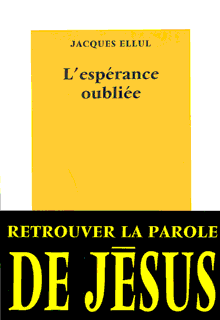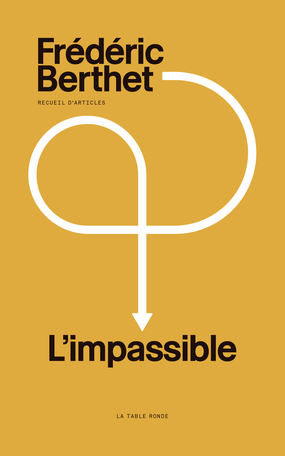L'espérance oubliée
- Contretemps
- Paru le 29/04/2004
- Genre : Essais et documents
- 304 pages - 140 x 205 mm
- EAN : 9782710326731
- ISBN : 2710326736
Foreign Rights
Hope in Time of Abandonment
Rights sold
Korea (Daejanggan)
USA (Wipf & Stock)
Presentation
Jacques Ellul brings us his most profound, most moving theological statement. For years, he had wanted to write a book on "The Age of Abandonment," for it seemed to him that both society and the church had reached that point described in Scripture when God turns his back and is silent. But when he came to elaborate this theme, Ellul found himself inexplicably writing on the theme of hope, despite the fact that his analysis of society remained unchanged. Hope was now no longer a matter of intellect, but a word asked by God of the heart for its salvation.
More than ever before, in this book Jacques Ellul shares with readers not only the darkest forebodings of contemporary man's soul, but also his own struggle to emerge from despair to a stronger level of Christian faith and hope. He writes of hope in a highly original and penetrating manner.
After a revelation that led him to Christianity and an intensive reading of Marx, Jacques Ellul studied law. He then devoted himself to reflection on the evolution of modern society. He noted the disappearance of rural life and the mechanization of man’s environment. He foresaw the magnitude of this ecological and social “great mutation”.
Considering that technique is the determining factor of modern society, he leads a critique of what he calls “technological tyranny”. He further analyses that technique self-increases, imposing its values of efficiency and technical progress, while denying man’s needs and culture as well as the nature.
Sociology is not his only field. His work is composed of theologian and historian output. Some would also say that he is a philosopher, although he did not define himself as such.
As a militant anarchist whose ideas are close to situationism, but also as a subtle commentator of Marxist thought and excesses, he was instrumental in the establishment of political ecology and reflections on Christian anarchism. He also wrote many theological works on the Gospel’s subversive and liberating aspects and on the “perversion” which the Christian revelation has suffered from. Some of his other works are thoughts on ethics and on hope.
Jacques Ellul can be considered as one of the fathers of the idea of rational economic decay and voluntary simplicity.
“Jacques Ellul, a true thinker” Royaliste
“A kind of clairvoyant who had already predict everything” Réforme
“His writings remained fiery, the prophet’s voice still resonates” La Croix
If you are interested in publishing one of our books or wish to receive further information, you can contact:
Anna Vateva, Foreign Rights : + 33 1 40 46 71 02
a.vateva@editionslatableronde.fr











